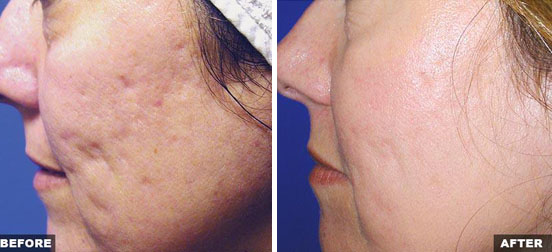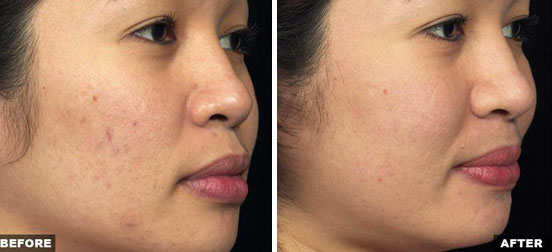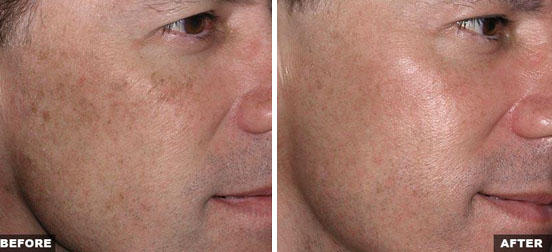Treatment for Acne Scars
What is Acne?
Acne is a skin condition with clogged pores usually called blackheads and whiteheads, inflamed pimples also called pustules and deeper lumps also called nodules or boils. Acne can occur anywhere on the body especially on the face, as well as the neck, chest, back, shoulders and upper arms. Although most adolescents are affected by acne, adults in their 20’s, 30’s, 40’s or even older, also develop acne. Acne can be disfiguring and upsetting to the patient. If gone untreated acne may leave scars which may be treated by Dr. Halem in the future. It is important to be proactive in preventing acne and acne scarring.

What causes acne?
Testosterone, a hormone which is present in both males and females, increases during puberty. This stimulates the sebaceous glands of the skin to enlarge, produce oil and plugs the pores. Whiteheads, blackheads and pimples are present in teenage years.
Acne also may develop later in life which is called adult acne. It may be related to many factors such as stress, hormone changes, childbirth, menopause or from stopping birth control. Many adult men and women suffer from acne. It is important to seek help as soon as possible as immediate treatment can prevent acne from worsening or even scarring.
What can I do about acne?
Acneic skin should not be washed too often or vigorously. Washing skin too much may actually make it worse. Washing your skin with a mild cleanser and warm water, daily, is best if you experience acne.
Food even chocolate does not cause acne, but some foods may aggravate acne and make it worse.
You should use water based, oil free or mineral cosmetics as possible. Choose products that are non-comedogenic or non-acnegenic. Always remember to properly remove your cosmetics every night with mild soap or cleanser and warm water before going to bed.

How do I treat it?
Before starting any regimen including topical medications, it is important that you inform Dr. Halem if you think you are or currently are pregnant. Also, if you are trying to get pregnant or nursing.
- Topicals – Dr. Halem may prescribe topical creams, gels or lotions with vitamin A acid-like drugs, benzoyl peroxide, or antibiotics. These products usually help open up the pores and reduce the bacteria. Depending on the product, you may experience some drying and peeling. You will be advised about correct usage and side effects that may occur.
- Acne Surgery – Acne surgery may be used to remove blackheads and whiteheads. You should not pick, scratch, pop or squeeze the pimples yourself. When the pimples are squeezed, more redness, swelling, inflammation, scarring and even spreadin g may occur.
- Injections – Some acne can be injected with corticosteroids to help reduce inflammation and assist acne to disappear quicker.
- Oral medications – Aside from Topical antibiotics, Oral antibiotics can be taken as well depending on the severity of the acne. Some types of oral antibiotics are : tetracycline, doxycycline, minocycline or erythromycin.
- Birth control pills may also help improve acne and may be prescribed specifically for acne. If you are currently on birth control it is important you advise Dr. Halem as some oral antibiotics may decrease the effectiveness of birth control pills.
- Accutane is used in some cases of severe acne. Patients using this drug must be monitored through the I Pledge system. Some requirements are monthly visits to the doctor as well monitoring blood work. Pregnancy must be prevented while using this medication.

Dr. Halem will evaluate your acne and suggest the appropriate treatment regimen. Remember that not everyone reacts to treatment the same way. Treatment may have to be altered after a few months.
What can we do for acne scarring?
Dr. Halem has many types of treatments available for acne scars. Depending on the downtime you may have, she can provide LASER treatments to resurface the skin or Chemical Peels. There are also other methods available to help reduce the appearance of acne scars such as fillers, electrosurgery or even grafting which can make a noticeable differences in appearance. Acne can be controlled with the proper products and/or treatments.













